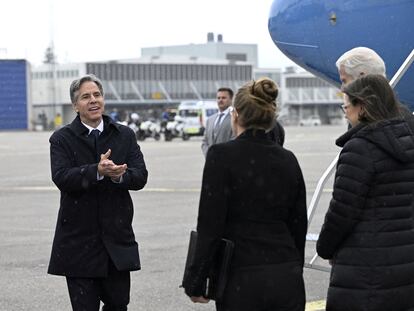Blinken travels to Riyadh in bid to repair US-Saudi Arabia relations
America will not leave a void in the Middle East to be filled by others, a high ranking official has asserted


After years of misunderstandings and months of diplomatic tension between two former inseparable allies, the United States hopes to put its relationship with Saudi Arabia back on track with next week’s trip to Riyadh by Secretary of State, Antony Blinken. It is the second visit by a senior U.S. official to the Arab country in a month, following the one completed by National Security Advisor Jake Sullivan on May 7.
The State Department confirmed the trip on Friday in a brief statement. Blinken, it says, will meet with Saudi officials over the course of a three-day visit to address “U.S.-Saudi strategic cooperation on regional and global issues and a range of bilateral issues including economic and security cooperation.” He will also participate in a forum with representatives of the Gulf Cooperation Council (GCC) and a meeting on combating Islamic State (ISIS) terrorism.
The ties between the world’s leading power and its traditional closest ally in the Middle East have been eroded for years, aggravated by the brutal murder of journalist Jamal Khashoggi, who was asphyxiated and dismembered in the Saudi consulate in Istanbul in 2018. For decades, the relationship was based on an exchange that suited both: Riyadh provided Washington with oil at a good price, and the United States supplied armament and Defense protection to Saudi Arabia. But the US is trying to reduce its dependence on fossil fuels and develop the use of alternative energy sources; and the Wahhabi monarchy perceives that the military protection of its theoretically stable partner is in doubt.
Issues such as its Iran policy further complicate ties: the Saudi regime erupted in anger over negotiations in 2015 for a nuclear deal between the West and Tehran, which Riyadh saw as endangering the security of the Gulf monarchies. Washington’s shift in its foreign policy, where the Middle East has ceased to be the priority and Asia-Pacific now commands the spotlight, is another factor straining the bilateral relationship.
In 2019, during the election campaign, eventual President Joe Biden assured that, if he reached the White House, he would treat Riyadh as “the pariah that it is.” Two years later, he had an intelligence report published denouncing that the Saudi crown prince and the country’s real power, Prince Mohammed bin Salman, had been behind the operation to assassinate Khashoggi.
In 2022, Biden traveled to Saudi Arabia on a controversial visit to try to stabilize the relationship, and to get a commitment from Bin Salman to stabilize oil prices. But in the fall the clashes returned, when Riyadh spearheaded an OPEC decision to limit oil production after a summer in which high energy prices had contributed to soaring inflation. A few weeks before a mid-term elections in which the performance of the economy was a crucial factor, the White House went ballistic.
Meanwhile, the Saudi government has been building bridges to China, America’s great systemic rival. Beijing is now the main buyer of the kingdom’s oil, and the main supplier of Riyadh’s imports. President Xi Jinping’s government scored a major diplomatic achievement when earlier this year it sponsored the agreement between Saudi Arabia and Iran, bitter enemies, to restore diplomatic relations.
The announcement of this agreement hit Washington hard. And it made it clear to what extent, however tense and uncomfortable ties may be, the relationship with Riyadh, a key player on the Middle East and energy security chessboard -including moderate oil prices-, is indispensable.
In the Middle East, one of the best things that can be done is to make sure that the bilateral relationship is strong, up to date, and reflects America’s priorities, and that the region understands that the United States is a major player that is there to stay, and won’t leave a void for other to fill, Deputy Assistant Secretary of State for the region Daniel Benaim said Friday in a telephone chat with reporters.
For Riyadh, the relationship with Washington also remains fundamental. Despite its concerns, the United States remains its main security partner and the only actor that, at present, is willing to guarantee the free movement of oil tankers in the Persian Gulf. Russia cannot and China, at least for the moment, does not want to, or cannot either.
In addition to the stability of the relationship, China’s role in the region and the war in Ukraine, Blinken also carries another delicate objective: trying to start paving the way for Saudi Arabia to consider following the path of the United Arab Emirates and Bahrain in the so-called Abraham agreements of 2020 in the future and normalize its relations with Israel. A possibility, still, at best, very distant today.
Sign up for our weekly newsletter to get more English-language news coverage from EL PAÍS USA Edition
Tu suscripción se está usando en otro dispositivo
¿Quieres añadir otro usuario a tu suscripción?
Si continúas leyendo en este dispositivo, no se podrá leer en el otro.
FlechaTu suscripción se está usando en otro dispositivo y solo puedes acceder a EL PAÍS desde un dispositivo a la vez.
Si quieres compartir tu cuenta, cambia tu suscripción a la modalidad Premium, así podrás añadir otro usuario. Cada uno accederá con su propia cuenta de email, lo que os permitirá personalizar vuestra experiencia en EL PAÍS.
¿Tienes una suscripción de empresa? Accede aquí para contratar más cuentas.
En el caso de no saber quién está usando tu cuenta, te recomendamos cambiar tu contraseña aquí.
Si decides continuar compartiendo tu cuenta, este mensaje se mostrará en tu dispositivo y en el de la otra persona que está usando tu cuenta de forma indefinida, afectando a tu experiencia de lectura. Puedes consultar aquí los términos y condiciones de la suscripción digital.








































